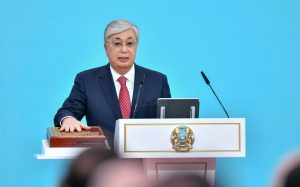Of all the many bits and pieces to parse from Kazakh President Kassym-Jomart Tokayev’s recent interview with the state-run Egemen Qazaqstan newspaper, his comment in response to a question regarding a system of “dual power” stands out as an almost Freudian slip. Tokayev said that at some point after the January 2022 unrest he “openly told Nursultan Abishuly Nazarbayev that the political arrogance of his close associates almost destroyed the country.”
Tokayev did not name names, naturally, and he most certainly is not referring to himself. But “close associate” would be an apt description of Tokayev, at least before January 2022. Tokayev’s entire political history was intertwined with Nazarbayev. His rise to power was specifically engineered by the former president, though not necessarily a shock to close observers.
For example, writing in The Diplomat in October 2018 one astute observer noted that “Near the top of many analysts’ lists of possible Nazarbayev successors is Kassym-Jomart Tokayev, the current chairman of the Senate, second only in power to Nazarbayev himself.” She went on to write however, that “where Tokayev may fall short is domestic policymaking. He lacks experience in implementing Kazakh domestic policy initiatives and that may call his long-term leadership potential into question.”
And indeed, it was the domestic sphere that presented Tokayev his greatest challenge. In his recent interview, Tokayev persists in the narrative that the January 2022 events were plotted and orchestrated, saying that “preparations” had begun six months earlier when the government made an “an ill-conceived, illegal decision to sharply increase the price of liquefied gas.”
That’s another slip of sorts. Tokayev became acting president in March 2019 when Nazarbayev stepped down, and was formally elected president in a snap vote that June. The government that made that “ill-conceived, illegal decision” was his.
He also blamed “extremists, criminal groups, and religious extremists” for the violence, seeking once again to externalize a problem of innately domestic character. On the religious extremist angle, RFE/RL’s Kazakh Service noted in its reporting that no charges of religious extremism have been brought against anyone in the very many trials that have occurred relation to the January events. RFE/RL’s English-language reporting noted that “[a]side from about 10 members of the fundamentalist Islamic group Yakyn Inkar – which is considered a banned extremist group in Kazakhstan – who were arrested in connection with the protests, no religious groups have been singled out for alleged involvement in the protests.”
The goal of the plot was to establish the very “dual power” system that many analysts have argued existed since March 2019. Here we return to the top, and Tokayev’s remark regarding what he told Nazarbayev.
“In any case,” he continued immediately after criticizing the political machinations of Nazarbayev’s associates, “I believe that there should be no senior or junior president in the country.”
We can guess who that exclamation is aimed at, from the context both on the digital page and the political milieu of the moment. Nazarbayev has been back in the news in recent months, from salacious reporting on his autobiography, in which he admits openly to being a polygamist, to a December 30 meeting with Russian President Vladimir Putin, which stirred up discussion of whether the former president was plotting a comeback. In his recent interview, Tokayev said the time was not right for his own memoir.
The January 3 interview conveniently presents Tokayev’s preferred narratives regarding the January 2022 unrest – as well as other matters, such as the erroneous assertion that there are no political prisoners in Kazakhstan (a comment and topic deserving of its own separate analysis) – but the timing also works to counter the resurgence of chatter about Nazarbayev.
As much as Tokayev tries, he may never come out from his predecessor’s long shadow.

































